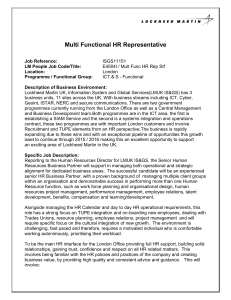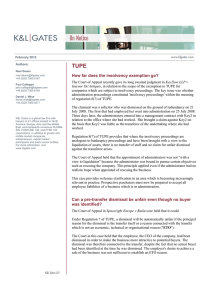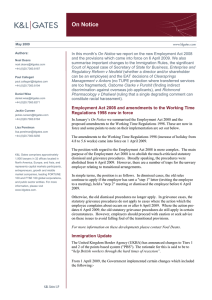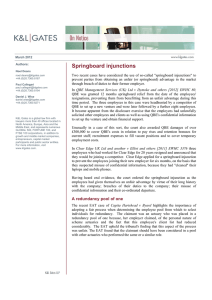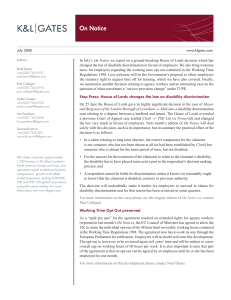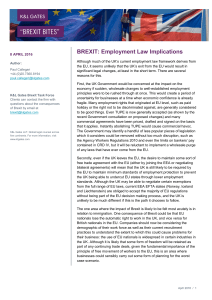Losing the Right to Dismiss for Misconduct Cook v MSHK Ltd,
advertisement
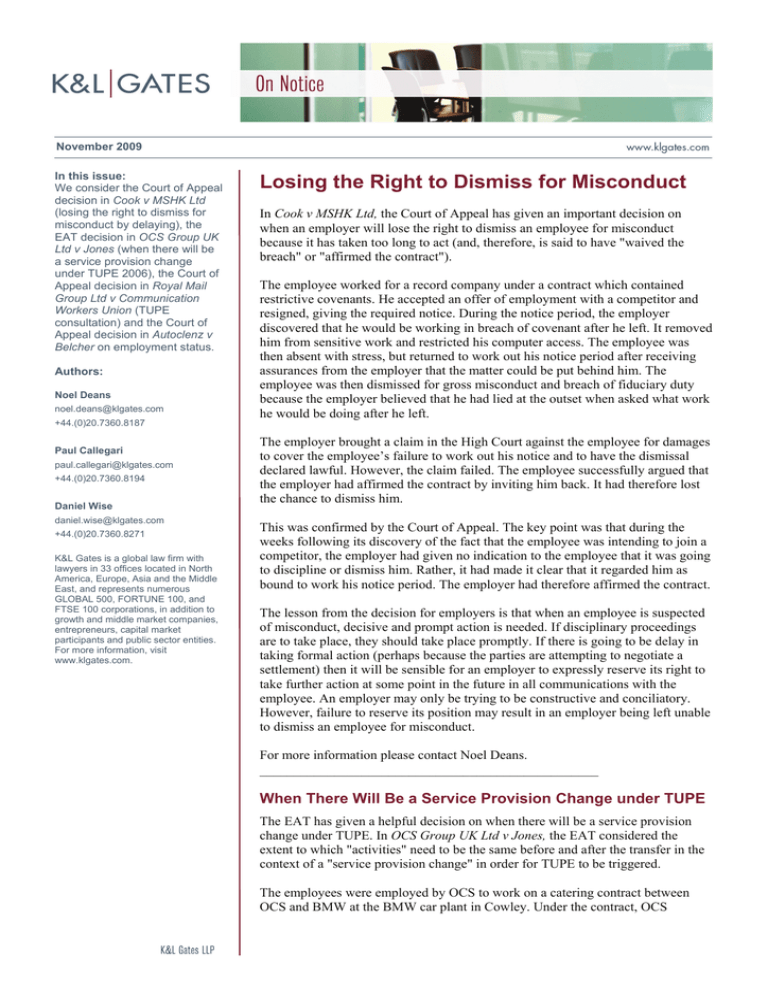
November 2009 In this issue: We consider the Court of Appeal decision in Cook v MSHK Ltd (losing the right to dismiss for misconduct by delaying), the EAT decision in OCS Group UK Ltd v Jones (when there will be a service provision change under TUPE 2006), the Court of Appeal decision in Royal Mail Group Ltd v Communication Workers Union (TUPE consultation) and the Court of Appeal decision in Autoclenz v Belcher on employment status. Authors: Noel Deans noel.deans@klgates.com +44.(0)20.7360.8187 Paul Callegari paul.callegari@klgates.com +44.(0)20.7360.8194 Daniel Wise daniel.wise@klgates.com +44.(0)20.7360.8271 K&L Gates is a global law firm with lawyers in 33 offices located in North America, Europe, Asia and the Middle East, and represents numerous GLOBAL 500, FORTUNE 100, and FTSE 100 corporations, in addition to growth and middle market companies, entrepreneurs, capital market participants and public sector entities. For more information, visit www.klgates.com. Losing the Right to Dismiss for Misconduct In Cook v MSHK Ltd, the Court of Appeal has given an important decision on when an employer will lose the right to dismiss an employee for misconduct because it has taken too long to act (and, therefore, is said to have "waived the breach" or "affirmed the contract"). The employee worked for a record company under a contract which contained restrictive covenants. He accepted an offer of employment with a competitor and resigned, giving the required notice. During the notice period, the employer discovered that he would be working in breach of covenant after he left. It removed him from sensitive work and restricted his computer access. The employee was then absent with stress, but returned to work out his notice period after receiving assurances from the employer that the matter could be put behind him. The employee was then dismissed for gross misconduct and breach of fiduciary duty because the employer believed that he had lied at the outset when asked what work he would be doing after he left. The employer brought a claim in the High Court against the employee for damages to cover the employee’s failure to work out his notice and to have the dismissal declared lawful. However, the claim failed. The employee successfully argued that the employer had affirmed the contract by inviting him back. It had therefore lost the chance to dismiss him. This was confirmed by the Court of Appeal. The key point was that during the weeks following its discovery of the fact that the employee was intending to join a competitor, the employer had given no indication to the employee that it was going to discipline or dismiss him. Rather, it had made it clear that it regarded him as bound to work his notice period. The employer had therefore affirmed the contract. The lesson from the decision for employers is that when an employee is suspected of misconduct, decisive and prompt action is needed. If disciplinary proceedings are to take place, they should take place promptly. If there is going to be delay in taking formal action (perhaps because the parties are attempting to negotiate a settlement) then it will be sensible for an employer to expressly reserve its right to take further action at some point in the future in all communications with the employee. An employer may only be trying to be constructive and conciliatory. However, failure to reserve its position may result in an employer being left unable to dismiss an employee for misconduct. For more information please contact Noel Deans. __________________________________________________ When There Will Be a Service Provision Change under TUPE The EAT has given a helpful decision on when there will be a service provision change under TUPE. In OCS Group UK Ltd v Jones, the EAT considered the extent to which "activities" need to be the same before and after the transfer in the context of a "service provision change" in order for TUPE to be triggered. The employees were employed by OCS to work on a catering contract between OCS and BMW at the BMW car plant in Cowley. Under the contract, OCS On Notice provided a restaurant and deli bar, 4 "satellites" and a shop on behalf of BMW. The satellites were required to provide English and continental breakfast, beverages, a lunch involving hot soup and cold baguettes, sandwiches, rolls, pizza and jacket potatoes together with hot and cold desserts. Since the contract was losing money, OCS eventually lost the contract and another provider (MIS) took over the contract at the plant. Under the new contract, only pre-packed sandwiches and salads were sold and there was no hot food preparation. When the OCS contract terminated, the employees brought claims against OCS. OCS argued that the employees had transferred to MIS. This was because the termination and reawarding of the contract constituted a service provision change under TUPE. Therefore, MIS should be liable for the employees' claims as liability transfers under TUPE. The ET decided that the employees did not transfer because the new contract was “materially different” from the old one in that it was a substantially reduced service. OCS appealed, arguing that the essential activity was the same the provision of food and catering services for the staff at the plant. The EAT agreed with the ET's decision. It found that the new contract was a "wholly different operation," and that the correct approach was to ask if the activities carried out were "fundamentally or essentially the same". The case illustrates the limitations of the definition of a service provision change under TUPE. The decision will be welcomed by incoming contractors since it gives them significant scope to use their own personnel and to avoid the onerous implications of TUPE by changing the way that the service is delivered. The decision should also be borne in mind by outgoing contractors since they are potentially liable to their employees for redundancy and other costs in the event that they do not transfer. However, organisations engaged in outsourcing should be careful to avoid using this case as a mechanism to seek to avoid the effects of TUPE, a tactic that has historically proved ineffective. Employers Do Not Warrant Accuracy of Information Given in TUPE Consultations In Royal Mail Group Ltd v CWU, the Court of Appeal has given an important decision on the extent of employers’ consultation obligations in a TUPE transfer situation. The employer (Royal Mail) was selling off some of its post office services to WH Smith. Regulation 13 of TUPE obliges an employer to inform employee representatives (or the employees themselves) of “the legal, economic and social implications of the transfer for any affected employees”. Failure to comply can lead to a penalty being imposed under Regulation 15. Royal Mail took the view that TUPE did not apply so that its employees did not transfer. It therefore did not inform the CWU (the employees’ representatives) that automatic transfers would take place. In the ET claims which arose from selling off post offices, the CWU took the view that the employees did transfer and consequently that Royal Mail was in breach of its obligation to consult under TUPE because its view was mistaken. The ET found that Royal Mail had no genuine belief in its view and was therefore in breach of the duty to consult. This was overturned by the EAT which found that Royal Mail did have a genuine belief in its view. This meant that it was not in breach of regulation 13, even if that view was mistaken. In a decision which will be welcomed by employers, the Court of Appeal upheld the EAT's decision. The only obligation on the transferor in a TUPE transfer situation is to communicate matters as it believes them to be. It does not warrant the truth of what it says. If it makes a genuine mistake about the legal implications of a transfer it will not be in breach of regulation 13. For more information please contact Daniel Wise. _________________________ For more information please contact Paul Callegari. _________________________ November 2009 2 On Notice Court of Appeal Decision on Employment Status In Autoclenz v Belcher, the Court of Appeal has given an important decision on employment status and written agreements. People performing work can be employees, workers or self-employed contractors. Their status is key, since apart from the tax implications, employees enjoy a wider range of statutory protections, including the right not to be unfairly dismissed. Workers enjoy some statutory rights (such as holiday pay) but do not have employees’ security of tenure. Contractors enjoy no statutory rights except certain rights under health and safety legislation. In this case the claimant and his colleagues were engaged by a car cleaning company as valeters. The company provided them with cleaning equipment for which they were charged. It also charged them for insurance. They paid their own tax and NI. The company then introduced contract terms which provided that, first, the valeters did not have to carry out the work personally – the “substitution” clause-- and, secondly, that there was no obligation on the company to provide work, nor on the valeters to accept work on a particular occasion – the “mutuality of obligation” clause. On the face of it, these clauses meant that the claimant was not an employee. The claimant claimed that he was an employee and therefore entitled to unpaid wages and holiday pay. The company defended the claim by maintaining that he was self-employed, and therefore not entitled to either. The ET decided that the claimant was an employee because of the degree of control the company had over him in terms of how he performed his duties. The company appealed, and the EAT found that the claimant was not an employee but was a worker. The EAT said that the mutuality of obligation clause was not a sham. To be a sham there had to be a joint intention by both sides to mislead and that was not the case here. Because that clause was valid, the claimant could not be an employee. The Court of Appeal agreed with the ET and decided that the claimant was an employee. While the terms of the written contract were important, it was the reality “on the ground” that counted. In this case there was a practice of requiring the valeters to notify the company if they were not going to turn up for work. This was inconsistent with the “mutuality of obligation” clause. Similarly, the “substitution clause” was not enforced. The written agreement did not reflect the true agreement between the parties. It was therefore a sham. A contract could be a sham without both parties deciding to mislead each other. The decision illustrates that, ultimately, it is the reality of the situation that counts. However, this is not to say that the terms of the contract are unimportant. They are still the first port-of-call. But the lesson from the case is that, in order to avoid an unwanted employment situation arising or vice versa, employers should ensure that the terms of the contract are actually enforced and reflected in the day to day practice of the parties. For more information please contact Noel Deans. _________________________ Anchorage Austin Beijing Berlin Boston Charlotte Chicago Dallas Dubai Fort Worth Frankfurt Harrisburg Hong Kong London Los Angeles Miami Newark New York Orange County Palo Alto Paris Pittsburgh Portland Raleigh Research Triangle Park San Diego San Francisco Seattle Shanghai Singapore Spokane/Coeur d’Alene Taipei Washington, D.C. K&L Gates is a global law firm with lawyers in 33 offices located in North America, Europe, Asia and the Middle East, and represents numerous GLOBAL 500, FORTUNE 100, and FTSE 100 corporations, in addition to growth and middle market companies, entrepreneurs, capital market participants and public sector entities. For more information, visit www.klgates.com. K&L Gates comprises multiple affiliated partnerships: a limited liability partnership with the full name K&L Gates LLP qualified in Delaware and maintaining offices throughout the United States, in Berlin and Frankfurt, Germany, in Beijing (K&L Gates LLP Beijing Representative Office), in Dubai, U.A.E., in Shanghai (K&L Gates LLP Shanghai Representative Office), and in Singapore; a limited liability partnership (also named K&L Gates LLP) incorporated in England and maintaining offices in London and Paris; a Taiwan general partnership (K&L Gates) maintaining an office in Taipei; and a Hong Kong general partnership (K&L Gates, Solicitors) maintaining an office in Hong Kong. K&L Gates maintains appropriate registrations in the jurisdictions in which its offices are located. A list of the partners in each entity is available for inspection at any K&L Gates office. This publication is for informational purposes and does not contain or convey legal advice. The information herein should not be used or relied upon in regard to any particular facts or circumstances without first consulting a lawyer. ©2009 K&L Gates LLP. All Rights Reserved. November 2009 3
